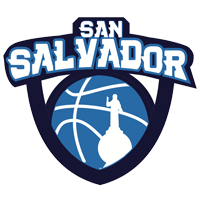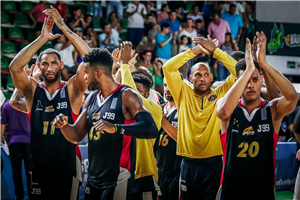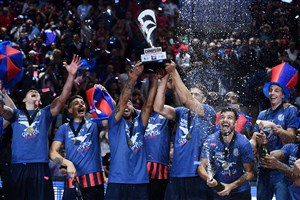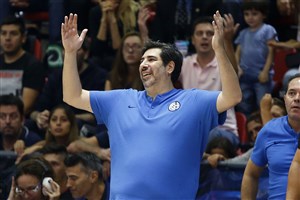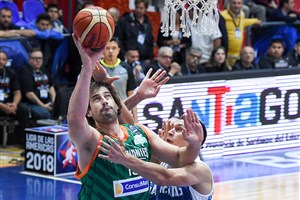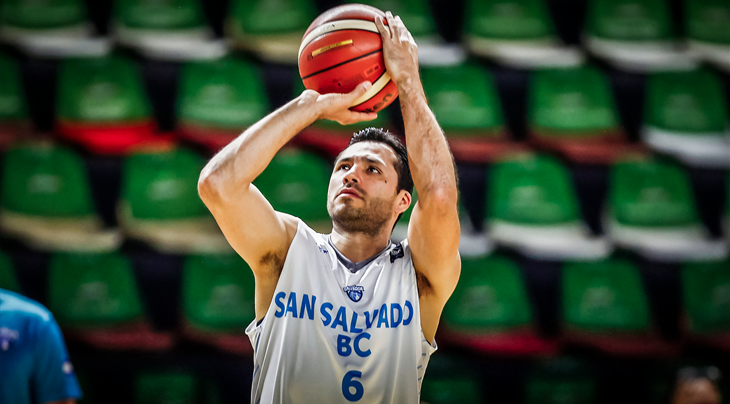
Work and Play: El Salvador’s Challenge
BY: PABLO CORMICK / PHOTOS: GASPAR NOBREGA
BAURU (DIRECTV Liga de las Americas 2018) - Every day, at 5:30 in the morning, the alarm clock goes off in Oscar Rivera’s home. At 37 years of age, and after getting —when in luck— 5 hours of sleep, he wakes his two sons to take them to school. After he drops them off he then goes directly to the private customs agency he owns since 2011. Over 10 hours after his day begins, and when there are no surprises at work that cause him to stay longer, he ends day in the agency. It is only then that he can begin to think about basketball, in the just two hours he can focus on it each day.
Julio Mancía, at 36 years of age, is also a father. In his case, he has two daughters. He works 8 hours a day as the San Salvador City Hall chief of press. Like his friend and colleague Rivera, that's only on the days when he can take his lunch break. But sometimes, his duties require him to eat while running errands, and without the care necessary for the selection of meals required for an athlete’s body. He trains the same amount of time —just two hours— as his teammate, Rivera.
 Julio Mancía, San Salvador City Hall chief of press, playing for San Salvador BC.
Julio Mancía, San Salvador City Hall chief of press, playing for San Salvador BC.
“I make a bit more as a player, but not so much. The truth is that I need both jobs. My family would have to lower its level of life if I would decide to dedicate myself 100% to basketball,” says Mancía, center of the El Salvador National Team. And adds: “We have the talent, but the lack of training affects us.”
In 2010, when Rivera worked at a bank, Mexican team Abejas de Guanajuato invited him to try the team out. The forward remembers: “I couldn't even leave my job at the bank because I wanted to try-out for a foreign team. It was a good opportunity, but the contract they offered me wasn't guaranteed. What would've happened if I quit my job and they cut me off the team?” Aside from missing the option of professionally playing abroad, Rivera no longer plays with the National Team. He did so until 2014. But his job’s demands kept him from playing for his country.
Mancía, as well, couldn’t always be present for the National Team. “In 2012 I worked for the United States Embassy and they didn't give me permission to travel to play at Centrobasket,” Julio adds.
 Carlos Arias, and his brother Alejandro, are businessmen while playing for San Salvador BC.
Carlos Arias, and his brother Alejandro, are businessmen while playing for San Salvador BC.
The Arias brothers, Carlos (28) and Alejandro (25) are partners in a business that produces and sells fruit and other types of smoothies. They began with this enterprise in 2014. At that time, they spent more time in this than in training. “Now we have employees and we're able to distribute time more equally between work and basketball,” Carlos explains. The brothers make more money as players than as businessmen. However, Carlos points out that they can't just do sports: “We're well positioned in national basketball, but that income wouldn't be enough.”
 Josué Ávila balances his school responsabilities with his basketball career.
Josué Ávila balances his school responsabilities with his basketball career.
Nineteen-year old Josué Ávila, is an aspiring English professor. He pays for private university with what he makes as a player. When he doesn't play in his city, he lives in the house he's given to by the team that signs him. If not, with his parents. To the 2 hours he trains with the team, he adds another 2 of practicing alone. “If I train a lot I may reach my objective of playing for a University in the United States,” the forward hopefully says. Meanwhile, he continues to study in the university that is the closest to the team that signs him.
They all play in San Salvador BC. And like theirs, there are dozens of stories in Salvadorian basketball —which is slowly, but surely, developing its professional league. There, national team players that have other jobs play together. Others spend all of their time in basketball. And foreigners, with higher salaries and experience, seek to elevate the competition's sporting level. Meanwhile, this is the reality of the side that represented the El Salvador Republic for the first time in Liga de las Américas.
Theirs is a challenge where they have the advantage. A lot of advantage.
FIBA
